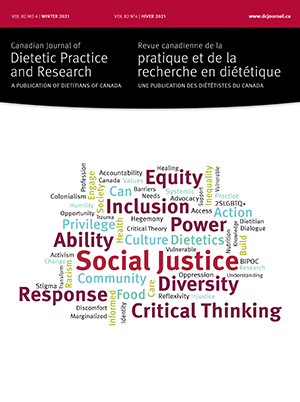Abstract
Purpose: The COVID-19 pandemic has impacted the lives of lesbian, gay, bi, trans, queer, and other groups (LGBTQ+) within Canada. This research aimed to explore the experiences of LGBTQ+ Canadians in relation to their nutritional needs, practices, and supports during the COVID-19 pandemic.
Methods: The qualitative study was framed within a poststructuralism and queer theory paradigm and consisted of an online questionnaire. Participants were recruited and asked to complete open-ended questions. Responses were coded using thematic analysis.
Results: Seventy participants completed the questionnaire. Data analysis resulted in 3 major themes, including (i) (dis)comforts of food and eating, (ii) shifting views of food and food practices, and (iii) what supports? The themes revealed that many LGBTQ+ individuals experienced stress and anxiety during the COVID-19 pandemic. It was a time in which their views and practices of food, cooking, and eating were changed. Nutritional supports were discussed in terms of family, friends, and partners.
Conclusion: The findings highlight the complexity to the meanings people give to food, cooking, and eating during stressful times. It is recommended that dietitians familiarize themselves with the experiences of LGBTQ+ people, especially during times of global health emergencies to ensure equitable health care for LGBTQ+ communities.
Résumé
Objectif. La pandémie de COVID-19 a eu un impact sur la vie des personnes lesbiennes, gaies, bisexuelles, transgenres, queers et issues d’autres groupes (LGBTQ+) au Canada. La recherche visait à explorer les expériences de Canadiennes et Canadiens issus de communautés LGBTQ+ relativement à leurs besoins, pratiques et soutiens en matière de nutrition durant la pandémie de COVID-19.
Méthodes. L’étude qualitative s’inscrivait dans un paradigme de poststructuralisme et de théorie queer et était basée sur un questionnaire en ligne. Les participants ont été recrutés et invités à répondre à des questions ouvertes. Les réponses ont été codées au moyen d’une analyse thématique.
Résultats. Soixante-dix participants ont rempli le questionnaire. L’analyse des données a permis de dégager trois grands thèmes : (i) les conforts et inconforts liés aux aliments et à l’alimentation, (ii) l’évolution des points de vue sur les aliments et les pratiques alimentaires, et (iii) les soutiens offerts. Les thèmes ont révélé que de nombreuses personnes LGBTQ+ ont éprouvé du stress et de l’anxiété pendant la période de pandémie de COVID-19. Au cours de cette période, leur vision et leurs pratiques en matière d’aliments, de cuisine et d’alimentation ont changé. Les soutiens nutritionnels ont été abordés relativement à la famille, aux amis et aux partenaires.
Conclusions. Les conclusions mettent en lumière la complexité des significations que les gens attribuent aux aliments, à la cuisine et à l’alimentation en période de stress. Il est recommandé aux diététistes de se familiariser avec ce que vivent les personnes LGBTQ+, particulièrement en situation d’urgence sanitaire mondiale, afin d’assurer des soins de santé équitables aux communautés LGBTQ+.



